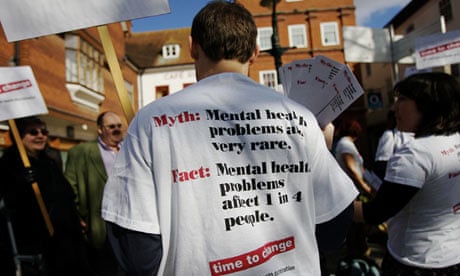It's often said that one of the best ways to tackle prejudice against those with mental health problems is for people to speak openly about their mental health. I think this is true and it works because while prejudice sees people as types, or even not quite as people, when an individual talks about their own experience, you can hardly fail to recognise a fellow human being.
But there are very good reasons for people choosing not to speak out. And chief among these is the discrimination they know they will encounter when they do so. It's a catch-22.
For me the process of coming out has been to some extent an inevitable consequence of what I do for a living. It would have been odd not to have written a novel set in the mental health system, as that's where I'd been for 10 years when I wrote it, and for much of that time the parameters of my world had extended very little beyond the psychiatric.
It's not a question of autobiography, but more that the themes I wanted to explore – What constitutes normality? How does language cope with extremes of experience? – were ones for which this context offered a fertile environment.
When my novel Poppy Shakespeare was published, it would have been odd not to mention my own experience as this is what was equipped me to write it, and so I did and, inevitably, it became a focus in interviews. In my first, with a woman from the Times, I somehow toppled backwards off my chair, landing on the floor. "We laughed as she picked herself up," she wrote. "But we were both embarrassed, more so than normal."
This column came about as a consequence of a piece I wrote for the Guardian when Poppy Shakespeare was published. And this is where I've spoken most directly about my own experience, but it was still only relatively recently that I revealed that I had been diagnosed with borderline personality disorder (BPD). The principal reason for my doing so was the publication of a book by Simon Baron-Cohen, Zero Degrees of Empathy, which struck me as so ill-informed, stigmatising and offensive that I felt morally obliged to use this space, the enormous privilege of a voice, to step out of the shadows and be counted.
The article I wrote led to a radio programme, On the Borderline, which was broadcast last week on BBC Radio 4. In it I explored what BPD "is", the history of the diagnosis, the controversy surrounding its future, and the very considerable prejudice people with this label encounter both in and out of the psychiatric system.
It's a prejudice I know something about. For 15 years I refused to talk about my diagnosis. My social worker even omitted it from my care-plan monitoring forms. BPD feels so fundamental, an error at the very core of who I am; if I had it (and how would I know, after all?), then my only hope was to keep it hidden and just hope nobody noticed.
On a personal level, therefore, making the programme felt decidedly risky. But it was also an opportunity to try to humanise the diagnosis. Could I do something, however small, to destigmatise the label? Or would I merely stigmatise myself? – the old catch-22.
I wasn't alone. Two other women, Amy White and Merinda Epstein, agreed to speak about their experiences of being diagnosed with BPD, and did so with eloquence, humour and passion.
Listening to them, I felt proud. Which is silly, I know, because as I said, I don't believe in types. And Merinda and Amy were clearly quite different from each other and also from me. But for what it's worth, and for as long as it lasts, I'll gladly share a label with them.




